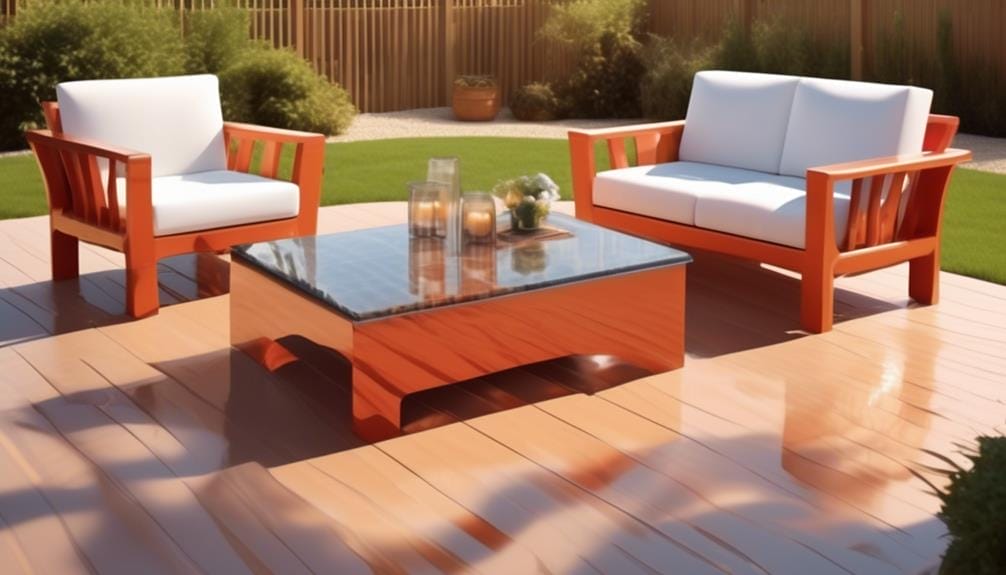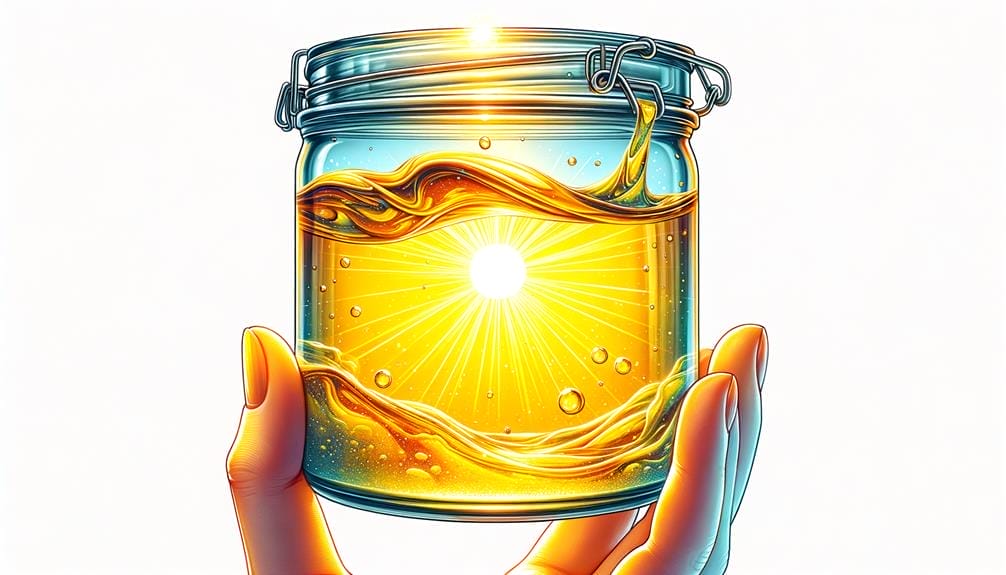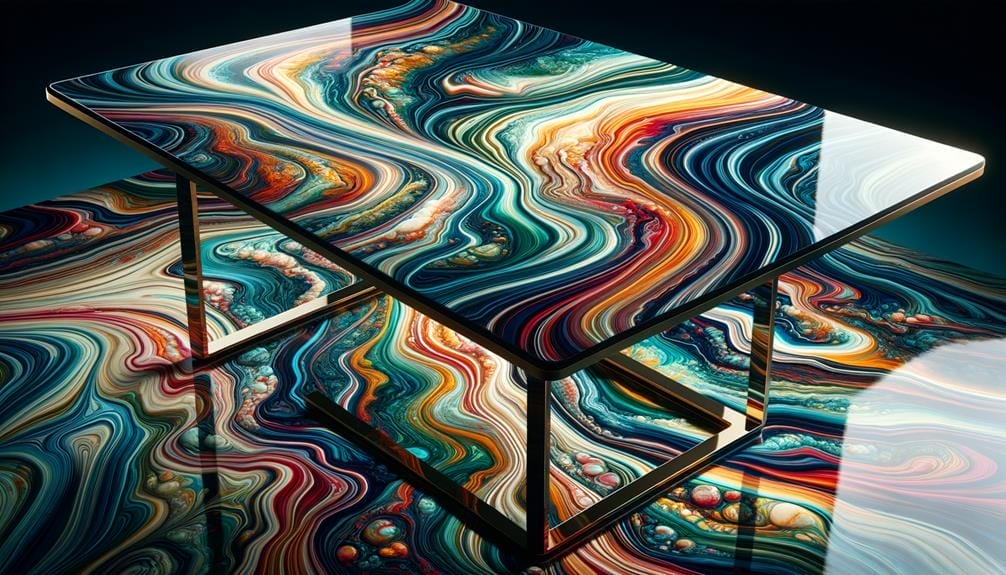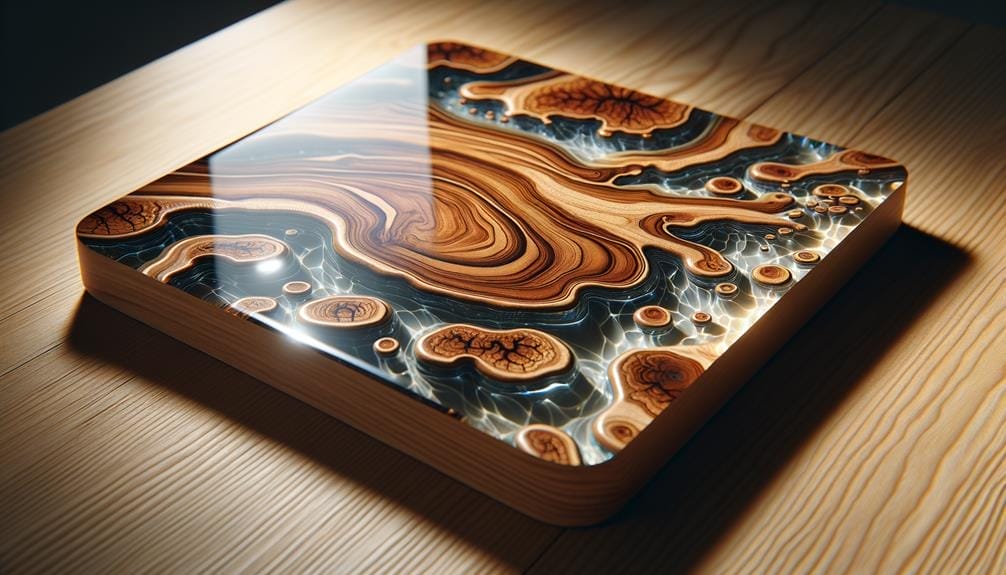Just like a delicate flower wilted under the scorching sun, unprotected epoxy resins can suffer the same fate when exposed to UV radiation. But fear not, as there is a solution to keep your epoxy projects thriving and vibrant.
In this discussion, you will discover the importance of UV resistance in epoxy resins, the factors that influence their resistance, and how you can enhance their protection. Stay tuned to learn more about the damaging effects of UV light on epoxy resins and the applications where UV resistance is crucial.
Don't let your epoxy projects fade away; there's a UV-resistant solution waiting for you.
Key Takeaways
- UV resistance is crucial for maintaining the integrity and aesthetic appeal of epoxy surfaces.
- Chemical composition and environmental conditions influence the UV resistance of epoxy resins.
- Clear, UV-resistant coatings provide a protective barrier against UV damage.
- Proper surface preparation, including complete curing and residue removal, is essential for effective UV protection.
Importance of UV Resistance
UV resistance is a critical factor in maintaining the integrity and aesthetic appeal of epoxy surfaces, particularly in outdoor and naturally lit environments. Epoxy resins are widely used in various projects due to their excellent mechanical and chemical properties. However, when exposed to UV light, epoxy surfaces can suffer from significant damage. UV light can cause the epoxy to yellow, fade, or even become brittle over time.
To protect epoxy surfaces from UV damage, it's essential to apply clear, UV-resistant urethane or varnish coatings. These coatings act as a protective barrier, shielding the epoxy from harmful UV rays. They prevent the epoxy from degrading and maintain its original appearance for an extended period. In areas with high levels of UV exposure, it's crucial to use UV-stable finish coats to ensure long-term UV protection.
Even partial exposure to sunlight can lead to UV damage, so it's essential to apply a clear, UV-stable urethane or varnish over the cured epoxy surface. This additional layer provides an extra level of protection against UV light, preventing discoloration and deterioration.
Advancements in stabilizing epoxy coatings include using a combination of UV absorber with Hindered Amine Light Stabilizers (HALS). This combination delays the damaging effects of UV on epoxy coatings, extending their lifespan and enhancing their UV resistance.
Factors Influencing UV Resistance
To understand the factors that affect the UV resistance of epoxy resins, it's important to consider the chemical composition and environmental conditions that contribute to the degradation of these surfaces over time. Exposure to UV light can have a significant impact on the physical properties of epoxy resins, making it crucial to use UV resistant epoxy coatings to prevent yellowing and maintain their integrity.
Factors Influencing UV Resistance:
- Chemical Composition: The chemical structure of epoxy resins plays a vital role in their resistance to UV light. Epoxy resins with a higher concentration of UV stabilizers and additives tend to have better UV resistance, as these components help to absorb or reflect UV rays.
- Environmental Conditions: The duration and intensity of UV exposure can vary depending on factors such as geographical location, altitude, and weather conditions. Epoxy surfaces exposed to prolonged UV radiation or in high UV exposure areas are more susceptible to degradation and discoloration.
- Protective Measures: Applying a clear, UV-stable finish coat, such as a urethane or varnish, over an epoxy surface can provide essential protection against UV light. Proper surface preparation, including complete curing, light sanding, and residue removal, is necessary to ensure the effectiveness of the UV-resistant top coat.
Understanding the factors that influence UV resistance in epoxy resins can help in selecting the appropriate materials and protective measures to ensure the longevity and aesthetic appeal of epoxy surfaces.
Enhancing UV Protection

Enhancing the UV protection of epoxy surfaces can be achieved through the application of clear, UV-resistant coatings that provide a barrier against UV damage. UV rays from sunlight can have detrimental effects on epoxy surfaces, causing discoloration, degradation, and reduced durability. To protect your epoxy projects in outdoor applications, it's essential to use UV-resistant epoxy or apply coats of UV-resistant varnish.
UV-resistant epoxy products like TotalBoat MakerPoxy Artists Resin are specifically designed to withstand UV exposure. These epoxy resins effectively resist damage from UV rays, making them suitable for use in areas exposed to sunlight. However, it's important to note that even UV-resistant epoxy can benefit from additional UV protection.
Clear, UV-resistant coatings such as TotalBoat Cast N Turn clear urethane resin or TotalBoat Halcyon clear gloss varnish can provide an extra layer of defense against UV damage. These coatings act as a protective barrier, shielding the epoxy surfaces from harmful UV rays. When applying a UV-stable coating, make sure the epoxy surface is fully cured and lightly scuff-sanded for proper adhesion. Follow the instructions provided by the manufacturer for the best results.
For outdoor epoxy surfaces, long-term UV protection depends on the UV-resistant top coat's ability to filter UV light. Higher gloss finishes tend to reflect more UV light, providing better protection. However, in areas with higher UV levels, more frequent maintenance coats may be necessary to ensure continuous UV protection.
UV Damage to Epoxy Resins
Epoxy resins are highly susceptible to UV damage, leading to discoloration and degradation when exposed to sunlight. UV rays can cause irreversible damage to epoxy projects, compromising their appearance and performance. Here are three important factors to consider regarding UV damage to epoxy resins:
- Level of UV Exposure: The extent of UV damage depends on the duration and intensity of UV exposure. Epoxy systems with UV resistance can withstand higher levels of UV radiation without significant degradation. Therefore, it's crucial to choose epoxy resins specifically designed for outdoor applications or areas with high UV exposure.
- Cured Epoxy Protection: While uncured epoxy resins may have some inherent UV resistance, it's the final cured state that requires proper protection. Applying a clear, UV-resistant urethane or varnish coating to the cured epoxy surface can provide effective protection against UV damage. However, it's essential to carefully prepare the surface through scuff-sanding and cleaning before applying the UV-stable finish coat.
- Maintenance and Environmental Factors: Long-term UV protection for outdoor epoxy surfaces requires regular maintenance and consideration of environmental factors. The type of top coat used, the intensity of UV exposure, and the surrounding environmental conditions can all impact the longevity of UV protection. Periodic maintenance coats may be necessary in high UV exposure areas to ensure continued protection.
Understanding the potential for UV damage to epoxy resins is crucial for maintaining the appearance and performance of epoxy projects. By selecting UV-resistant epoxy systems, applying appropriate protective coatings, and considering environmental factors, you can enhance the UV resistance of epoxy and extend its lifespan.
Outdoor Applications and UV Resistance

UV-resistant epoxy products are designed to provide protection against UV damage, making them an excellent choice for outdoor applications. When exposed to UV light from the sun, epoxy resins can undergo photochemical processes that lead to degradation, discoloration, and loss of mechanical properties. However, by using UV-resistant epoxy resins, you can protect your outdoor projects from UV damage and ensure their longevity.
To achieve long-term UV protection for outdoor epoxy surfaces, it's crucial to apply a clear, UV-stable coating such as aliphatic polyurethane or varnish. These coatings act as a barrier, shielding the epoxy resin from harmful UV rays. It's important to note that the epoxy resin should be fully cured before applying the UV-stable coating to ensure optimal protection.
The level of UV protection required for outdoor epoxy surfaces may vary depending on factors such as location, altitude, and exposure to sunlight. Even partial exposure to sunlight warrants the application of a clear, UV-stable urethane or varnish to prevent discoloration and maintain the longevity of the epoxy surface.
Frequently Asked Questions
Are Epoxy Resins UV Resistant?
Epoxy resins are not inherently UV resistant. To enhance UV resistance, use epoxy coatings with UV protection for outdoor projects. Protect the epoxy surface with a UV-stable top coat to prevent damage and yellowing.
What Is the UV Stability of Epoxy?
UV stability of epoxy resins depends on factors like UV protection additives, testing methods, and UV resistant coatings. Comparing UV resistance to other resins, it's crucial for outdoor applications. UV stabilizers enhance durability and color stability, especially for marine use.
Which Resin Is Most UV Resistant?
The most UV-resistant resin depends on several factors. Comparing different types of epoxy resins, outdoor applications benefit from UV-resistant coatings. Additives can enhance UV stability, and testing methods are used to assess resistance.
Will Epoxy Resin Cure Under UV Light?
Epoxy resin will not cure under UV light alone. UV resistance of epoxy resins depends on factors like curing time, additives, and surface preparation. Applying a UV-stable finish coat and regular maintenance can enhance epoxy's long-term UV resistance.
Conclusion
Protect your epoxy projects from the damaging effects of UV light by choosing UV-resistant epoxy resins from Copps Industries. Our knowledgeable team can assist you in selecting the right product for your specific needs and provide guidance on protecting epoxy surfaces.
Don't let UV light compromise the longevity and appearance of your projects. With our UV-resistant epoxy resins, you can ensure durability and maintain the desired aesthetic for years to come.
Trust Copps Industries for all your UV protection needs.





